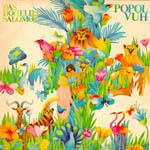
Popol Vuh became a group at the end of the 1960's thanks to
the figure of keyboard player Florian Fricke, who was also interested in the cinema. They recorded mostly in the 1970's
but released LPs sporadically through the 1990's.
With their first record, Affenstunde, the group (in that period it was just a trio with Holger Trulzsch on the percussion and Frank Fiedler at the sinthetizer) was included among cosmic music of Tangerine Dream but they distinguished themselves by their remarkable spiritualism. That record was the first one made by a group of rock music using the big Moog (not the mini-Moog).
Their next work In Den Garten Pharaos signed a more radical division between their own music and the clichè of cosmic music. Title-track begins with an apocalyptical atmosphere, an emphatic organ and chorus overture such as King Crimson; but percussions, wich are less and less linear up to become a psychedelic effect of frenetic noises and the prolonging organistic "wall", made that endless swoon a supernatural experience. So doing Fricke blends epic chaos of A Saucerful Of Secrets (noisy percussions plus ghostly choir) with indian mantra ecstasy.
Having disowned "black" tribalism of teutonic rock, Vuh is a masterpiece of atmospheric and celestial spiritualism, it is quite similar to a grave and humble church music. It is a rustling noise, a no time electronic vocalism, a tabla whispering with paradisiac notes. This ceremonial goes slowly in a disquieting emptiness according to the millionary rhythm of universe. Fricke's music explores metaphysical dens towards the essence of things looking for the interior sounds of oriental guru.
The best exemple of this new expression has been given by the Hosianna Mantra mess. Fricke's liturgy gives up to the magniloquent electronic of Tangerine Dream and discovers a more intimal and closed tone where cosmic music is considered universal harmony instead of sketch of science fiction, a "fioretto francescano" instead of symphonic hurricane, just like catharsical human music. Fricke's acoustic mysticism approaches ancient and modern music obtaining right music to space catacombs.
Hosianna Mantra's miraculous balance between sacred and profane, liturgic and laic, future and past, is the first one in popular music history (nothing to compare with Electric Prunes). Fricke (piano) and his classical group (Conny Veit, guitar, Robert Eliscu, oboe, Fritz Sonnleiter, violin, Klaus Wiese, tamboura, and Djong Yun, soprano from Korea) create a dreaming and crystal atmosphere, weak and fading, perfumed and charming. This group can be considered a small ensemble of chamber music.
The emotional crackling of instruments and slow melodies contribute to the restoration of natural order, in the name of a revision which refuses violence as instrument of liberation and leads to a state of huge ecstasy. Ah! intensive opening notes of piano seem to communicate at a distance with cembalo and violin so to build up a complete repeated scheme with infinitive variations.
Kyrie is an oniric whispering and its struggle lirics plunge into a thin rain of tamboura, piano and oboe. Eponymus mantra is a nervous crescendo of heavenly chords fluctuating without cohesion and dominated by oboe's melodies. Oboe is the leading instrument of Abschied, with a sad melody well connected to Renaissance dance theme, executed in ralenti.
But Segnung and Nicht Noch Im Himmel go back to "freeform" accompainment because of soprano's humble chant, with more and more humble and lyric prayers (in particular the second one, the more celestial and oniric of the whole album), alternating sometimes the guitar. Melody is reduced to the essential, a phrase continually repeated, and rhythm is almost completely inexistent.
Hosianna Mantra overturns the link between rock music and its traditional ispirations, infact they can all found among Indian folk, Renaissance chant, Baroque suite, Gregorian liturgy. Hosianna Mantra is the masterpiece of religious rock too, infinitely more genial than raga rock of Santana and others.
Accompanied by the devoted Daniel Fishelsher and by always different musicians, Fricke compose the mystic trilogy of Seligpreisung, Einsjager und Siebenjager and Das Hohelied Salomos, all extracted from sacred books. Having left the radical ascetism of the masterpiece, the music uses a compromise, but preserving its own simplicity.
Letzte Tage Letze Nachte, in trio again, finally changes direction, looking for a more easy and rhythmical sound, although lyric and maestoso. The monumentality and the arcane fascination of this suite link toghether to the requirements of cinema. Not by chance, Fricke becomes a devoted partner of director Werner Herzog, and composes many soundtracks for him ("Aguirre", "Kaspar Hauser", Coeur De Verre", "Nosferatu", "Fitzcarraldo", "Cobra Verde"). The best ones are Aguirre (in two parts) and Sohne Des Lichts (from "Nosferatu").
Later Fricke composed faint works, in particular Die Nacht Der Seele with Renate Knaup (ex Amon Duul) as singer. He comes back to Hosianna Mantra inspiration with the Tantric Songs, a collection of small chamber mantra and melodic sketches such as Harold Budd style (Listen He Who Ventures). The long Brothers Of Darkness has got a kind of unique brightness that is not evident in the first works, although its singing is sterile, according to a new tendency in the new age era.
Agape Agape suite (on the eponymous album) and Take The Tension High (on Spirit Of Peace) represent a period of transition ending with kinematical sound of City Raga, with Maya Rose as singer, Daniel Fischlscher at the guitar and Guido Hyeronymus at the keyboards.
Popol Vuh was an important band for having reacted to the cosmic monumentalism of german rock works of mere lyric suggestion, recovering a way of making music within the rhythm of ancestral origin.
No comments:
Post a Comment